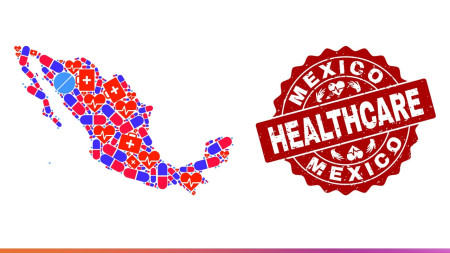2025 Mexico EHR Market Report: Technology Growth Amid Structural and Regulatory Barriers, Released by Black Book Research

HOUSTON, April 7, 2025 (Newswire.com) - Mexico's Electronic Health Record (EHR) sector is experiencing steady growth as healthcare providers, health systems, and policymakers continue to prioritize digital transformation initiatives. According to the 2025 Mexico EHR Market Report by Black Book, survey responses from 187 physician practices and 220 hospital managers reveal a growing interest in EHR systems across both public and private healthcare institutions. Despite this progress, significant structural and regulatory barriers remain, slowing the pace of widespread adoption.
EHR Growth in a Publicly Funded, Decentralized System
Mexico's healthcare system is highly segmented, with public institutions such as the Mexican Institute for Social Security (IMSS) and the Institute for Social Security and Services for State Workers (ISSSTE) operating alongside private providers. This fragmentation, coupled with inconsistent infrastructure investment, continues to challenge cohesive EHR deployment at scale. The national EHR market, valued at $1.26 billion in 2023, is projected to grow to $1.66 billion by 2030, representing a 4.0% compound annual growth rate (CAGR). Growth is concentrated in urban hospitals and academic health systems, where funding and technical capabilities are more robust.
Key Barriers to EHR Adoption in Mexico
Survey respondents identified several critical barriers to EHR adoption:
98% cited financial constraints and the lack of dedicated EHR funding programs, particularly affecting smaller facilities and rural providers.
89% reported resistance to change among clinical staff, compounded by significant IT workforce shortages.
91% expressed concerns over data privacy and security, particularly in compliance with Mexico's personal data protection laws.
97% pointed to the absence of a unified national digital health strategy, with regulatory oversight fragmented across multiple government agencies.
Smaller hospitals and community clinics are disproportionately affected, lacking the financial and technical capacity to transition from paper-based records or fragmented legacy systems, according to 100% of respondents.
Regulatory and Policy Landscape
Mexico's regulatory environment for digital health remains in transition. While no single framework governs EHR deployment, several key policies intersect:
The Federal Law on Protection of Personal Data Held by Private Parties mandates robust patient data protections and informed consent for data processing.
In 2023, the Ministry of Health updated Appendix X, providing new regulatory guidance on Software as a Medical Device (SaMD), which impacts how EHR platforms are classified and monitored.
The lack of a centralized digital health authority complicates vendor certification, interoperability standards, and coordinated national deployment. However, efforts to align regulatory frameworks with international best practices are underway.
Interoperability and Infrastructure Development
Interoperability is emerging as a priority for government and larger provider systems. The IMSS, one of the world's largest public healthcare organizations, has made significant progress by developing internal HL7 messaging infrastructure and maintaining a vast EMR database with over 53 million patient records. Efforts to expand interoperability tools, such as HL7 Gateways, aim to enable secure data exchange between fragmented public and private health systems. However, 95% of mid-sized and rural providers report lacking the digital infrastructure necessary to participate in national data exchange, limiting real-time patient information sharing and cross-system coordination.
Outlook: Strategic Investment Required
"Mexico's EHR sector is poised for transformative growth, but unlocking its full potential demands bold, coordinated action across public policy, technological advancement, and interoperability frameworks," said Doug Brown, Founder of Black Book Research. "To overcome entrenched barriers, stakeholders must prioritize substantial investment in digital infrastructure, workforce development, and scalable solutions that address the unique challenges of a fragmented healthcare system. As regulatory frameworks mature and funding mechanisms evolve, the rapid adoption of EHRs will hinge on institutions implementing cutting-edge privacy safeguards, fortified cybersecurity protocols, and adherence to internationally recognized digital health standards. Only through a unified and forward-thinking approach can Mexico achieve a sustainable and impactful digital transformation in healthcare."
Mexico's EHR Vendors
In Mexico's hospital sector, several key EHR vendors have established a strong presence:
Tesi Group: A leading local provider offering the Tesi HIS solution, widely adopted for its integrated clinical, administrative, and financial capabilities.
InterSystems: Its global platform TrakCare is recognized for advanced interoperability and modular hospital functionality.
Dedalus (formerly DXC Technology): Expanding in large hospitals and public-sector tenders with its ORBIS system, highly rated in the 2025 Black Book EHR user survey across Spanish-speaking Central and South America.
MV SOUL by NTT Data and Philips Tasy: Gaining ground among high-acuity facilities for their scalability and clinical depth.
HarmoniMD by Medwave: Has achieved high satisfaction ratings in Mexico for its cloud-based hospital EHR functionality tailored to Latin American healthcare workflows.
Other notable vendors include SoftClinic by JVS Group, MEDIWARE (Medsi), and Oracle Cerner, which also appeared in Black Book's top ten for Mexico as graded on the research firm's eighteen proprietary key performance indicators centric to Latin American HIT vendor evaluations.
In the ambulatory and physician practice space, local and regional vendors dominate:
eVitalSoft: Tailored to general practitioners and specialists, offering clinical recordkeeping, e-prescribing, and scheduling.
SISNova: Provides practice management and EHR tools for small to mid-sized clinics.
SalusOne: Combines EHR with telehealth capabilities, popular among outpatient providers.
ClinicCloud: A Spanish-language cloud-based EHR widely adopted in small practices for its usability and patient engagement tools.
EVA Health and Alephoo: Included in Black Book's 2025 top-rated list for their intuitive interfaces and compliance with data protection regulations.
About Black Book™
Black Book™ is an internationally recognized leader in healthcare technology insights, delivering high-impact, data-driven research to healthcare providers, technology buyers, investors, and suppliers. Since 2004, Black Book has been polling business-to-business leaders in Mexico and Latin America on client satisfaction with software vendors, providing unmatched insights into regional markets. With over two decades of competitive intelligence, Black Book's rigorous, vendor-agnostic methodology evaluates operational, clinical, and financial performance across the digital health ecosystem. Its findings are widely cited by global media and industry analysts, serving as a trusted benchmarking resource that informs strategy, drives innovation, and supports smarter decision-making across the healthcare continuum.
For more information, visit Black Book Research.
Contact Information
Press Office
research@blackbookmarketresearch.com
8008637590
Source: Black Book Research
